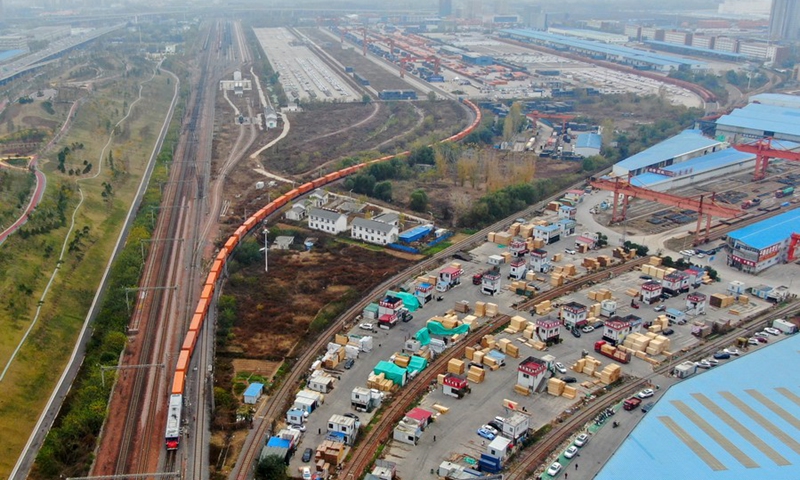
Aerial photo shows a China-Europe freight train. Photo: Xinhua
China's trade with central and eastern European countries has been on the rise despite the pandemic, as the outbreak has driven demand for certain items such as medical devices and home products both in China and Europe, officials and business representatives said on Wednesday.
Assistant Commerce Minister Ren Hongbin told a press conference on Wednesday that China's trade with 17 central and eastern European countries rose by an annual average of 8 percent from 2012 to 2020, more than double the trade growth between China and the EU.
In the first quarter of this year, China's trade with those countries surged by 50.2 percent year-on-year to $30.13 billion, far above China's average trade growth during the corresponding period. In particular, China's imports from central and eastern European countries rose 44.7 percent, Ren disclosed.
The scale of bilateral investment is approaching $20 billion in areas ranging from car parts and home appliances to mining and logistics. Some industries, like new energy and health, are becoming "new investment hotspots" amid the pandemic.
Ren said that Chinese companies signed engineering project contracts worth $5.4 billion in 2020, up 34.6 percent on a yearly basis. Projects like the Budapest-Belgrade railway are progressing steadily despite the pandemic, he noted.
Several companies told the Global Times that orders from central/eastern European customers, as well as exports from those countries to China, have risen as the pandemic drives demand for certain products such as medical devices and home products.
According to data sent by business-to-business cross-border e-commerce platform DHgate to the Global Times, exports of home-related products such as TVs to central/eastern Europe rose more than 300 times from April 2020 to the end of last year on the platform, while exports of small home appliances surged 77 times. In particular, exports to Lithuania rose more than 276 percent on a yearly basis.
The surge was a result of local people's improving living conditions amid insufficient production of daily goods by local factories, which fueled orders for Chinese-made goods. People seeking alternatives to mass transport as a result of the coronavirus boosted growth of related products. Exports of scooters, for example, rose nearly 50 times in Poland.
Peter Zhang, vice general manager of the Shaoxing-based MinFound Medical Systems Co, a producer of CT scanners, told the Global Times on Wednesday that since last year, inquiries from countries like Greece, Hungary, Lithuania, Latvia, Poland and Albania have surged by more than 300 percent.
He also noted that the company's engineers will head for Bulgaria soon to install two CT scanners with artificial intelligence-backed coronavirus checking functions.
Apart from exports, certain imports from central/eastern European countries into China have also risen amid the pandemic. Zhang Peng, general manager of CEE Investment Trade, said that the company's sales of Czech-made crystal glass in China are up two or three times this year, which he attributed to the consumption upgrading trend in China in the post-pandemic era.
However, he said there are still many challenges for trade business with those countries. For example, the pandemic has caused many European factories to halt production, while stimulus plans have pushed overseas demand higher, making supplies to Chinese customers more difficult.
Shipping costs are also rising and personnel movements between China and Europe have been disrupted. "Now it takes me about six weeks to make a business trip to and from from central/eastern Europe," he said.
Peter Zhang said he hoped that Chinese personnel who have taken COVID-19 vaccines and passed health checks would be given more convenience in visas and quarantine rules by European countries, so that medical companies' staff could work more efficiently.

